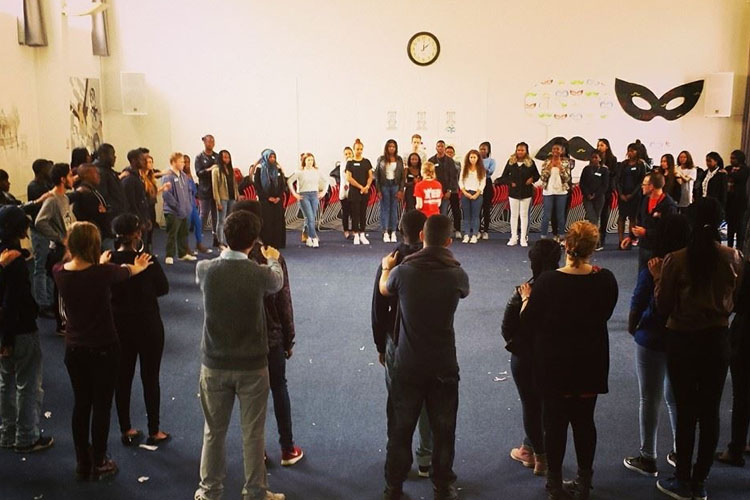- Theme
- General
- Age Range
- 7-18
- Type
- Games
- Number of Participants
- 10+
- Timescale
- 5-10 minutes
Quick overview
A large group game that works well for focusing a group in an active way. Jockeys works with any age and any number, as long as you have space!
Game type
Focuser
Supplies you’ll need
None.
Prep
Make sure that the area you’ll be using has plenty of space to move around in without being obstructed by chairs, walls, bags etc. This is a good game for playing outside.
How to run Jockeys
- To begin, have your group make a large circle, making sure they are stood side by side and not bunched together.
- Number the young people either ‘1’ or ‘2’. Once everyone has been numbered ask for the number ‘1’s to take a step forward and the number ‘2’s to stand behind a number ‘1’. You should end up with everyone stood in pairs with the number ‘2’s stood behind the number ‘1’s and this’ll create 2 circles: an inner circle who are the ‘horses’ and an outer circle who are the ‘jockeys’. Once the young people are in place it is worth mentioning this will be their present role as it helps with explanation later.
- Now the young people are numbered and know their roles; explain to the jockeys that you are going to shout out instructions and they have to follow the said instructions to stay in. These instructions are:
- Jockey Up: The Jockeys put their hands on the sholders of their ‘horse’
- Jockey Down: The Jockeys put their hands down by their sides
- Jockey Switch: The Jockey and Horse change places so that the horse is now acting as the jockey and the jockey is now acting as the horse.
- Jockey Left: All the Jockeys (and not the horses) run to their left around the outside of the circle to try and get back to their horse first.
- Jockey Right: All the Jockeys (and not the horses) run to their right around the outside of the circle to try and get back to their horse first.
- There are several ways young people can be knocked out of this challenge:
- They don’t follow an action when you say ‘jockey’ in front of it.
- They follow and action when you don’t say ‘jockey in front of it. This is similar to ‘Simon says’, for example you could say ‘up’ instead of ‘Jockey up’
- They are the last to get back to their horse in one of the races that ensue ‘jockey left’ or ‘jockey right’.
- They flinch or do any action which is not what you have asked them to do.
- If a jockey is knocked out, their horse is knocked out as well.
- When leading this game, give a flurry of commands very quickly to try and confuse the groups.
- When a pair is knocked out, they will need to stand out the way. However, try to keep them involved by keeping them close and having them be your judges. As judges get them to keep an eye on those who are still playing.
- The winning pair follows all the instructions without any errors until every other pair is knocked out.
